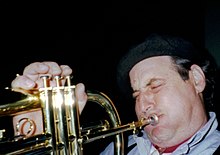
Austin Klezmorim is a klezmer music group founded in 1979 in Austin, Texas by trumpeter and composer Bill Averbach. [1] [ citation needed ]

Austin Klezmorim is a klezmer music group founded in 1979 in Austin, Texas by trumpeter and composer Bill Averbach. [1] [ citation needed ]
Compilations
Founded by trumpeter and composer Bill Averbach and based out of Austin, Texas, The Austin Klezmorim have performed concerts and festivals throughout the Southwest as members of the Texas Commission on the Arts Touring Artist Roster. Their influence has played an important role in the development of Austin music's more eclectic music reputation as the first modern "Klezmer" band in Texas and the oldest Klezmer band in the Southwest. [2] [ citation needed ] Their music is a fusion of the traditional Klezmer, Jazz, worldbeat, and indigenous Texas music. The group combines the older, traditional music with more contemporary styles in order to keep the music alive and growing.[ citation needed ]
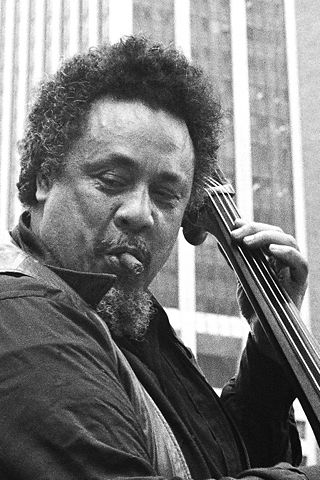
Charles Mingus Jr. was an American jazz upright bassist, composer, bandleader, pianist, and author. A major proponent of collective improvisation, he is considered one of the greatest jazz musicians and composers in history, with a career spanning three decades and collaborations with other jazz greats such as Duke Ellington, Charlie Parker, Max Roach, and Eric Dolphy. Mingus's work ranged from advanced bebop and avant-garde jazz with small and midsize ensembles to pioneering the post-bop style on seminal recordings like Pithecanthropus Erectus (1956) and Mingus Ah Um (1959) and progressive big band experiments such as The Black Saint and the Sinner Lady (1963).

Klezmer is an instrumental musical tradition of the Ashkenazi Jews of Central and Eastern Europe. The essential elements of the tradition include dance tunes, ritual melodies, and virtuosic improvisations played for listening; these would have been played at weddings and other social functions. The musical genre incorporated elements of many other musical genres including Ottoman music, Baroque music, German and Slavic folk dances, and religious Jewish music. As the music arrived in the United States, it lost some of its traditional ritual elements and adopted elements of American big band and popular music. Among the European-born klezmers who popularized the genre in the United States in the 1910s and 1920s were Dave Tarras and Naftule Brandwein; they were followed by American-born musicians such as Max Epstein, Sid Beckerman and Ray Musiker.

Germany claims some of the most renowned composers, singers, producers and performers of the world. Germany is the largest music market in Europe, and third largest in the world.

The vast majority of the inhabitants of the United States are immigrants or descendants of immigrants. This article will focus on the music of these communities and discuss its roots in countries across Africa, Europe and Asia, excluding only Native American music, indigenous and immigrant Latinos, Puerto Rican music, Hawaiian music and African American music. The music of Irish- and Scottish-Americans will be a special focus, due to their extreme influence on Appalachian folk music and other genres. These sorts of music are often sustained and promoted by a variety of ethnic organizations.

Leticia ("Tish") Hinojosa is a folksinger recording in both Spanish and English. Hinojosa was the youngest of 13 children. Hinojosa's parents were Mexican immigrants. Known for singing both traditional Mexican folksongs and her own original songs, both in Spanish and English, Hinojosa accompanies herself on guitar, which she plays right-handed although she is naturally lefthanded. Influenced by traditional Mexican, folk, Tejano, conjunto, and country musics, Hinojosa considers her music to be music of the US/Mexico border.
The Flying Bulgars was a Toronto-based Canadian band, which played music rooted in the Jewish music of Eastern Europe. The band's style incorporated elements of rock, jazz and salsa. 'Bulgar' in the group's name refers to a dance form, not an ethnic group.
Henry "Hank" Sapoznik is an American author, record and radio producer and performer of traditional Yiddish and American music.
The Klezmorim, founded in Berkeley, California, in 1975, was the world's first klezmer revival band, widely credited with spearheading the global renaissance of klezmer in the 1970s and 1980s. Initially featuring flute and strings—notably the exotic fiddling of co-founder David Skuse—the ensemble reorganized into a "loose, roaring, funky" brass/reed/percussion band fronted by co-founder Lev Liberman's saxophones and founding member David Julian Gray's clarinets. As a professional performing and recording ensemble focused on recreating the lost sounds of early 20th century klezmer bands, The Klezmorim achieved crossover success, garnering a Grammy nomination in 1982 for their album Metropolis and selling out major concert venues across North America and Europe, including Carnegie Hall and L'Olympia in Paris. The band performed steadily until 1993, regrouping in 2004 for a European tour.

The Klezmatics are an American klezmer music group based in New York City, who have achieved fame singing in several languages, most notably mixing older Yiddish tunes with other types of more contemporary music of differing origins. They have also recorded pieces in Aramaic and Bavarian.
Klezmer-loshn is an extinct derivative of the Yiddish language. It was a kind of argot, or cant used by travelling Jewish musicians, known as klezmorim (klezmers), in Eastern Europe prior to the 20th century.
German Goldenshteyn, or Goldenshtayn was a Romanian-born American klezmer musician.
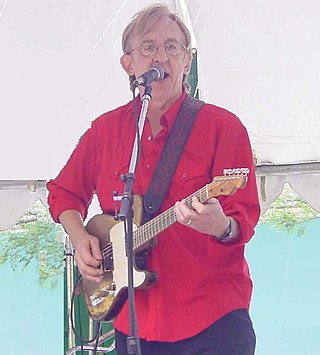
William Knight Kirchen is an American guitarist, singer and songwriter. He was a member of Commander Cody and His Lost Planet Airmen from 1967 to the mid-1970s and later worked with Nick Lowe. Guitar Player magazine described Kirchen as "Titan of The Telecaster" for his prowess on the guitar.

Since Biblical times, music has held an important role in many Jews' lives. Jewish music has been influenced by surrounding Gentile traditions and Jewish sources preserved over time. Jewish musical contributions on the other hand tend to reflect the cultures of the countries in which Jews live, the most notable examples being classical and popular music in the United States and Europe. However, other music is unique to particular Jewish communities, such as klezmer of Eastern Europe.

Balkan brass, popularly known by the Serbian name Truba, is a distinctive style of music originating in the Balkan region as a fusion between military music and folk music. In recent years, it has become popular in a techno-synth fusion throughout Europe, and in pop music in the Anglo-American sphere and throughout the world. Songs like Worth It by Fifth Harmony and Talk Dirty by Jason Derulo have brought the style to a new audience. In traditional form, it is popular throughout the Balkans, especially in Serbia, North Macedonia, Bulgaria, Moldova, and Romania, although the turbo-folk variety attracts larger audiences. The energetic and fast beats encourage dance and are egalitarian, often resulting in participation by the entire audience; this unpretentious relationship with audiences, highly charged energy and loud and joyful performances by highly skilled musicians has contributed to its successes. Fans of bands inspired by Balkan bands, such as Gogol Bordello, often state that it is a type of music better experienced than listened to.
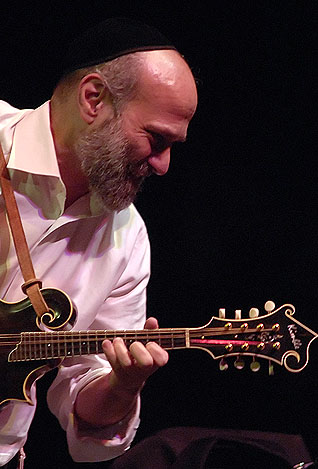
Andrew Edward Statman is a noted American klezmer clarinetist and bluegrass/newgrass mandolinist.
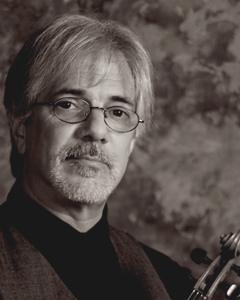
Kenny Kosek, is an American fiddler who plays bluegrass, country, klezmer, folk music and roots music. In addition to his solo career, he has performed with many other well-known performers and contributed to film and television soundtrack music. He is also a musical educator. He is a graduate of the Bronx High School of Science and City College of New York.

Del Castillo is a Latin rock band, based in Austin, Texas.

Mark Rubin is an American multi-instrumentalist, songwriter, producer of music for television and motion pictures, published critic, educator. Founder of proto-Americana acts Killbilly in Dallas, Texas, in 1989 and the Bad Livers, Austin Texas, in 1990, Rubin is best known as a bassist and tuba player. Today he lives and works in the musical community of South Louisiana based in New Orleans and tours frequently performing his own original material as "Jew of Oklahoma".

Amsterdam Klezmer Band, sometimes referred to as AKB, is a Dutch-Jewish musical group created in 1996 in Amsterdam. The band plays Yiddish and Klezmer music, but also incorporates sounds from Balkan, jazz, Romani, and hip-hop music. The band has described itself as a "mini brass band", but features prominent vocals as well.
The Maxwell Street Klezmer Band is a Chicago-based klezmer ensemble. It was founded by Lori Lippitz in 1983 and is directed by violinist Alex Koffman. The band's educational and outreach focus led to the establishment of the Klezmer Music Foundation, which continues to support Maxwell Street Klezmer Band among other professional and amateur groups. Maxwell Street Klezmer Band has performed and toured across the United States, United Kingdom and Europe. Notable performances have also included those at Carnegie Hall and alongside the Lyric Opera of Chicago in 2014. In addition to performing on stage, Maxwell Street Klezmer Band also plays for weddings, bar/bat mitzvah ceremonies, Jewish community celebrations, and other events.